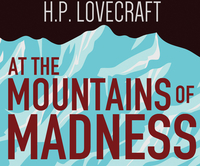Take a photo of a barcode or cover
adventurous
dark
mysterious
slow-paced
Plot or Character Driven:
Plot
Strong character development:
Complicated
Loveable characters:
Complicated
Diverse cast of characters:
No
Flaws of characters a main focus:
No
adventurous
dark
mysterious
reflective
tense
slow-paced
Plot or Character Driven:
Plot
Strong character development:
No
Loveable characters:
Complicated
Diverse cast of characters:
Complicated
Flaws of characters a main focus:
No
adventurous
challenging
dark
mysterious
reflective
tense
medium-paced
Plot or Character Driven:
Plot
Strong character development:
No
Loveable characters:
No
Diverse cast of characters:
Yes
Flaws of characters a main focus:
Yes
This book definitely put a little fear in me, but there would have been much more if he didn't overly describe the landscape. It got frustrating pretty quickly for me.
In "Berge des Wahnsinns" beschreibt Lovecraft eine Antarktisexpedition. Der Protagonist möchte mit diesem Bericht zukünftige Reisende warnen, denn das Team hat vor Ort schreckliche und äußerst bedrohliche Dinge entdeckt.
Der Schreibstil ist recht wissenschaftlich und bringt viele Fachbegriffe mit sich. Obwohl ich viele dieser Begriffe nicht kannte, hat das Buch so viele Bilder erzeugt, dass diese Unkenntnis überhaupt nicht hinderlich war. Ich war Teil der Reise und habe diese wie eine Art Film erlebt. So etwas schaffen Bücher selten.
Die Geschichte ist sehr interessant geschrieben. Die Bericht-Form sorgt auf eine sehr geschickte Weise für eine gewisse Neutralität, sodass Wahnsinn und Abenteuer sehr ausgewogen erscheinen.
Ich freue mich auf weitere Geschichten aus Lovecrafts Feder.
Der Schreibstil ist recht wissenschaftlich und bringt viele Fachbegriffe mit sich. Obwohl ich viele dieser Begriffe nicht kannte, hat das Buch so viele Bilder erzeugt, dass diese Unkenntnis überhaupt nicht hinderlich war. Ich war Teil der Reise und habe diese wie eine Art Film erlebt. So etwas schaffen Bücher selten.
Die Geschichte ist sehr interessant geschrieben. Die Bericht-Form sorgt auf eine sehr geschickte Weise für eine gewisse Neutralität, sodass Wahnsinn und Abenteuer sehr ausgewogen erscheinen.
Ich freue mich auf weitere Geschichten aus Lovecrafts Feder.
I have a hard time rating this, because it left me with such mixed feelings. First of all, this is my very first time reading Lovecraft. My first impression, based on this, is that he had a wonderful sense of imagination. I was really drawn to the mythological elements of the story. However, I found the surrounding story mostly an excuse to get to that part. I was intrigued and filled with a sense of dread from the very start, but that feeling never evolved into anything deeper. I am definitely going to explore more of his work, though.
adventurous
challenging
dark
tense
slow-paced
An erudite temple hunt story at the end of the Earth where humanity seeks what they do not understand. I found the beginning and a lot of the middle challenging to get through, but the ending sticks with me. While I don't know if I can recommend this book to just anyone, it is a piece of literature worth attempting if you can push beyond its inception.
Curiosity is a timeless vehicle for horror. We can sympathize with the impulse of a character opening a locked door or sticking their arm into a dank, dark hole in the wall, all while wincing in preparation for something grotesque to emerge. At the Mountains of Madness is driven by a fatal curiosity that resonates with me even today, some 90 years after its writing. H.P. Lovecraft's story slides from wonder into terror, as an Antarctic expedition discovers a complex and violent civilization that thrived on Earth millions of years before the dawn of mankind. The revelations, in typical Lovecraft fashion, spoil the sanity of the otherwise rational scientists we follow; but the pedantic and overwrought narration slows the story down on too many occasions.
Lovecraft had an incredible imagination, but (at least in this case) he didn't trust the reader to share in his own wonder and excitement. Instead of leaving the boring details of this ancient race's complete history up to the reader to assume, he spends page after page explaining a world we never see. Sure, it's all very interesting to learn about the seaward migration of these Old Ones and their shapeless alien slaves, but how does that enhance the mystery of the ruins and tunnels our protagonists explore throughout the book? In the opening chapters, the alien splendor of these impossible prehuman cities is chilling; the strange anatomy of the Old Ones is difficult to picture in your mind; and even within the story the characters can hardly find their way around in the snow and darkness. Those were the most frightening parts of the book, and I only wish Lovecraft would have let the me fumble in the snow and darkness too.
Like many, my introduction to Lovecraft was through fiction that drew inspiration from his mind-boggling mythos. An almost worrying degree of fantasy and science fiction takes after him, mostly without acknowledging the racist and xenophobic heart of his writings. Even here, where the Antarctic setting is explicitly uninhabited by human beings, he still manages to negatively compare the Old Ones and their alien slave race—revealing that the latter are primal monsters hell-bent on revenge and incapable of the delicate, baroque artistic skill of their cultured masters. Lovecraft explains that the Old Ones, despite their wisdom, were arrogant and foolish to try to control the formless Shoggoths. Sure, this could be read as a benign story of two bizarre and almost magical alien races, but as we know where he stood on matters of race and modernization, it's easy to extrapolate what this part of his mythos alludes to. This won't stop me from reading more of his work, but it's impossible to separate the man's perspective from his fiction.
Lovecraft had an incredible imagination, but (at least in this case) he didn't trust the reader to share in his own wonder and excitement. Instead of leaving the boring details of this ancient race's complete history up to the reader to assume, he spends page after page explaining a world we never see. Sure, it's all very interesting to learn about the seaward migration of these Old Ones and their shapeless alien slaves, but how does that enhance the mystery of the ruins and tunnels our protagonists explore throughout the book? In the opening chapters, the alien splendor of these impossible prehuman cities is chilling; the strange anatomy of the Old Ones is difficult to picture in your mind; and even within the story the characters can hardly find their way around in the snow and darkness. Those were the most frightening parts of the book, and I only wish Lovecraft would have let the me fumble in the snow and darkness too.
Like many, my introduction to Lovecraft was through fiction that drew inspiration from his mind-boggling mythos. An almost worrying degree of fantasy and science fiction takes after him, mostly without acknowledging the racist and xenophobic heart of his writings. Even here, where the Antarctic setting is explicitly uninhabited by human beings, he still manages to negatively compare the Old Ones and their alien slave race—revealing that the latter are primal monsters hell-bent on revenge and incapable of the delicate, baroque artistic skill of their cultured masters. Lovecraft explains that the Old Ones, despite their wisdom, were arrogant and foolish to try to control the formless Shoggoths. Sure, this could be read as a benign story of two bizarre and almost magical alien races, but as we know where he stood on matters of race and modernization, it's easy to extrapolate what this part of his mythos alludes to. This won't stop me from reading more of his work, but it's impossible to separate the man's perspective from his fiction.
kind of loved this but I also found it hard to finish
challenging
dark
mysterious
slow-paced
Plot or Character Driven:
Plot
Strong character development:
No
Loveable characters:
No
Diverse cast of characters:
No







